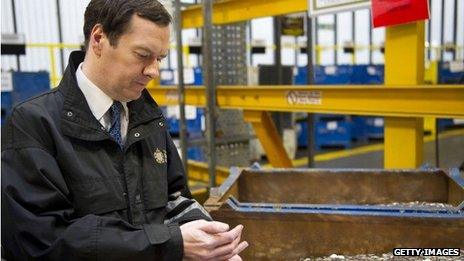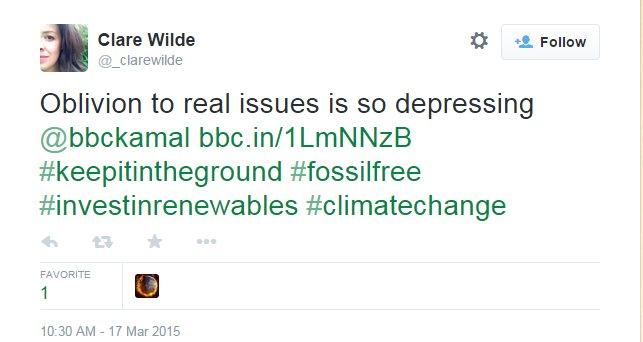Budget 2015: The four things business will be looking out for
- Published
- comments

At 12.30 today, the Chancellor of the Exchequer will rise to his feet for the final Budget of this government.
Of course, much of what will follow over the next hour will focus on the politics and economics of the occasion, and my colleague Robert Peston has blogged on that.
But beyond the public finances, and market reaction to any "giveaways" by George Osborne, there will be specific issues that business will be watching out for.
Before we consider those, it is worth mentioning an interesting point made to me by one chief executive of a major British business ahead of the Autumn Statement last December.
"What would be best for business is if the government didn't announce very much at all," he said. "Keeping out of business and being consistent rather than chopping and changing is the best for us."
For that business leader, the Budget is not a great day with its long list of initiatives and policy changes.
So, on to the four key issues I think will most interest business.
First, the North Sea oil and gas industry will be waiting to hear the details of the tax and investment package planned to support that ailing sector.
As I wrote yesterday, there is likely to be a major tax cut in what is known as the "supplementary tax rate".
That will be launched alongside a new investment allowance tax relief to encourage oil and gas businesses to remain committed to the sector.
Sir Ian Wood, the government advisor and former chief executive of the Wood Group, told the BBC that without action up to 100,000 jobs could be lost to an industry that employs 450,000 people in the UK and accounts for £15bn in exports.
There was quite a response on Twitter to my earlier blog about the North Sea, which did not mention the issue of climate change.
Here's one of the rather more polite tweets I received:

So, I will mention this time that many climate change campaigners believe that we should be turning away from fossil fuels and focusing on renewables.
Others argue that fossil fuels are an essential part of the energy mix, vital to keeping the British and global economy going.
Further, they argue, the North Sea is a vital part of the UK's economic strength and industrial skills base.
For my take on the remarkable importance of oil you can take a look at this.
Given that the Conservatives long abandoned the slogan "Vote Blue, Go Green" (remember that natty little logo of the tree?), it is unlikely that Mr Osborne will say much about the environment in his Budget.
'Google tax'
Some of my Twitter followers will be disappointed, no doubt.
The second area for business to focus on are the further details expected in the Budget of what has become known - much to the irritation of the technology giant - as the "Google tax".
The move is aimed at taxing what the government considers to be profits made in this country by businesses headquartered elsewhere such as Google, Facebook and Amazon.
They create a lot of revenue in the UK but, because of complicated licensing and investment deals, make virtually no profit here and therefore pay very little direct tax.
Senior figures close to the technology companies point out that their structures are agreed by Her Majesty's Revenue and Customs as being appropriate and that they abide by all the rules.
They also, of course, create jobs.
And despite the myriad headlines about the new "crack down" on large corporations paying their "fair share" of tax, even the government admits that this new diverted profits tax will not create much new revenue, just £355m a year by 2020.
There are also likely to be some new moves on tax evasion, with the government looking at both the issue of intent and whether those who "aid and abet" evasion - lawyers and accountants for example - can be held criminally accountable.
'Burden of proof'
I wrote about the intent issue here. And it is worth remembering Mr Osborne's quote at the International Monetary Fund meeting last April:
"We are changing the balance of the law so the burden of proof falls on those who are hiding their money offshore and we don't have to prove that they intended to do so," he said.
The chancellor was referring to undeclared income held in offshore bank accounts and whether holding such accounts could in itself constitute a criminal offence.
Since then an OECD process aimed at creating a global rule book on tax has rather slowed progress, and the government could again miss the opportunity to tighten the rules, despite Osborne's stated desire.
Finally, let us not forget the Northern Powerhouse. That is the Treasury's plan to spread the proceeds of growth around the country through infrastructure investment.
Expect more money for rail and road improvements and plans to devolve economic decision making powers to cities across the UK.
The fact that many Labour councils which run cities like Liverpool and Manchester welcome the government's plans has not been lost on Mr Osborne.
Look, he can say, even my opponents support me.